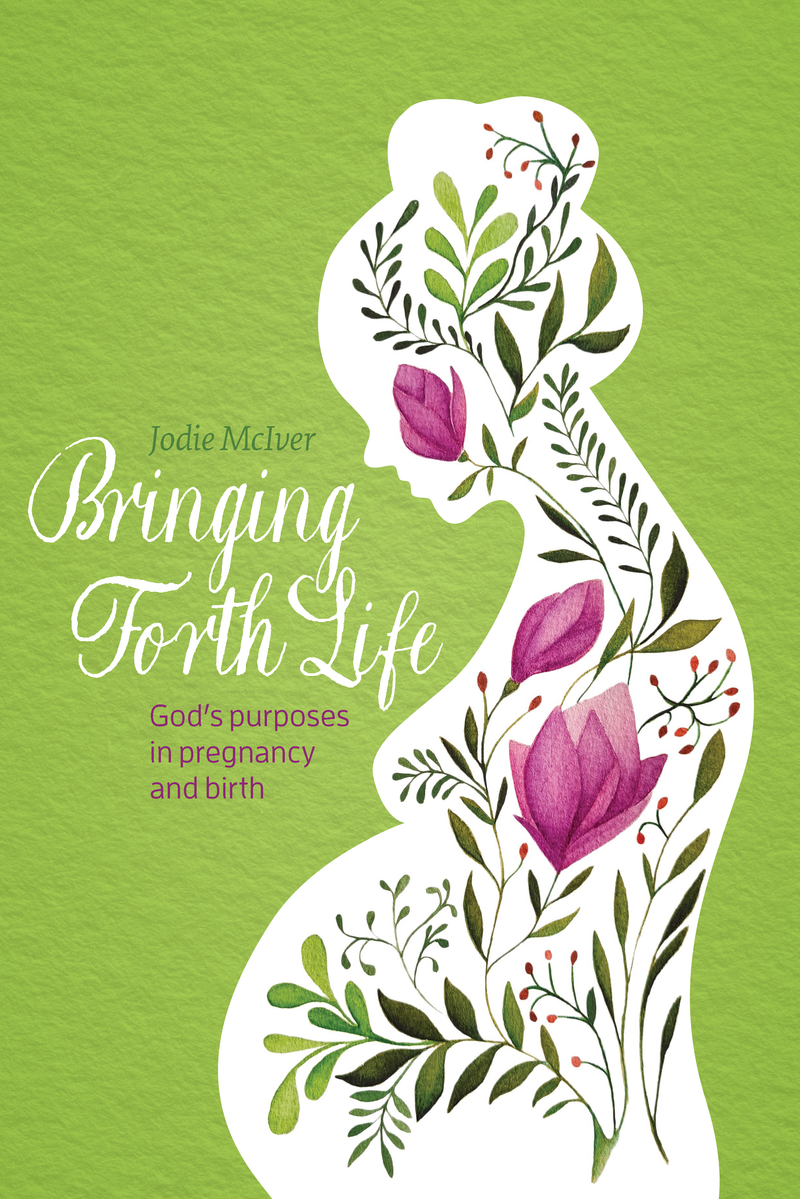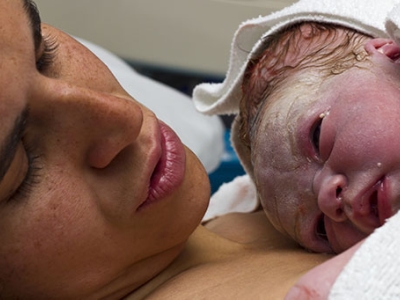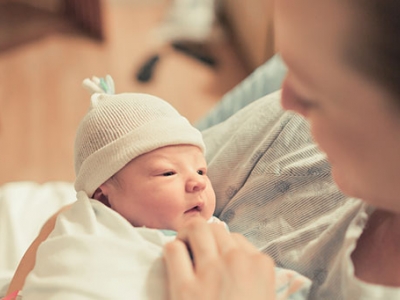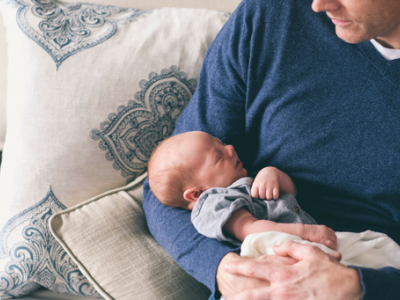
A bigger picture of birth
An extract from 'Bringing Forth Life: God's Purposes in Pregnancy and Birth'
My fascination with birth began at three years of age, when I watched my mother give birth to my brother. Throughout her labour I was busily tending to my doll, changing her nappy and listening to her heartbeat with a stethoscope. As the exciting moment of birth approached, I attentively watched my brother, Tim, emerging into our lives. Again, at six years old, I was back at the birth centre, witnessing my mother give birth to my sister, Tarn.
Most parents don’t choose for their children to be part of their birth, but it certainly has an impact. In retrospect it’s not surprising that a year after finishing school, I became the youngest student in the first Bachelor of Midwifery degree in NSW. This meant that I could become a midwife without detouring to study nursing on the way.
I find the female body intriguing, particularly in the way that it can adjust every function with clockwork precision to support the growth of a new little human within. I have enjoyed being involved with pregnancy, birth and new parenthood ever since, firstly as a midwife and then as a new mother myself.
Midwifery and ministry
During my twenties I was also deeply involved in the spiritual care of young women through my church. I felt a real tension between these twin vocations as the demands of shiftwork greatly reduced my capacity for church involvement. My decision to resign my midwifery position and enrol in a full-time theology degree was either a well-thought-out assessment of priorities or a spontaneous whim, depending on who you ask.
After graduating from Bible college, I began to live a double life. It wasn’t quite as dramatic as being a superhero in disguise, but I felt the weight of juggling two entirely separate careers. Some days I would go off to work as a midwife, caring for the physical and emotional needs of women with their new babies. Other days I worked in church ministry alongside my new husband, caring for the spiritual and emotional needs of young women. It took me a long time to realise that these two roles ought not have been as separate as they were. Eventually this led me to begin thinking about the spiritual significance of birth.
A few years ago, a prominent local church minister with thousands of Facebook friends posted a request for Christian resources on birth. He wanted to help a pregnant woman in his church who was feeling anxious. I was shocked at how little was available. Reflecting upon my own experiences in ministry, midwifery and having my own children, I realised I also hadn’t come across much about pregnancy and birth from a Christian perspective—or indeed thought about its spiritual significance myself.
This is what has led me to write this book.
A spiritual element to birth
Many cultures traditionally held a spiritual understanding of birth as representing a fine line between life and what lies beyond. But in Western cultures, responsibility for birth has shifted from the family and community to the medical establishment, and its spiritual undertones have largely been diminished or forgotten. Birth in Western countries is now seen primarily as a medical event. But in many circumstances, birth need not be a medical event at all.
Many women feel a sense of something miraculous when giving birth to their babies. Even without a particular faith background, they become more religiously or spiritually-minded as a result. I frequently have the privilege of observing women marvel with disbelief at the warm squishy newborn that has grown into existence inside of them.
Marvelling at maternity
Every new little person that I watch emerging from within their mother loudly declares to me the presence of a divine Creator. I love the scene in British drama Call the Midwife where elderly Sister Monica Joan is examining a placenta after birth and loudly proclaims ‘I see the miracle of God himself’. This sentiment that the divine designer has left visible fingerprints on birth rings true to me.
It is not only the new baby that is cause for reflection, but also the experience of being involved in bringing forth this new life. Women and men feel changed by their experience of birth in various ways. This sense of wonder at birth fits with the claim of the Bible, that ‘since the creation of the world God’s invisible qualities—his eternal power and divine nature—have been clearly seen, being understood from what has been made’ (Romans 1:20). I hope that the exploration of the amazingly beautiful functioning of our female bodies in the chapters ahead will lead you to awe at our Creator as you experience your own pregnancy and birth.
This is just the beginning though. While there is a lot to be understood about birth from watching or experiencing it ourselves, we can come to a much deeper understanding by also looking at God’s perspective on birth, revealed in the Bible. I believe that understanding what the Bible has to say actually elevates our view of female bodies, birth, motherhood and their immense impact on the world. It also helps us make sense of their challenging aspects. In fact, research testifies that those who can understand birth in the context of their spiritual and religious beliefs are more likely to have a positive birth experience.1
The Bible reveals eternal significance in pregnancy and birth and highly values this unique female experience. For a book written thousands of years ago in a strongly patriarchal society, the Bible speaks about pregnancy and birth a lot—more than 230 explicit mentions! Some of these discussions of birth are metaphorical, but that emphasises its significance all the more. God chooses birth to help us understand the deep realities of his own relationship with us and the world.
By entering into birth ourselves, we join in this divine story in a new and tangible way. These life-changing experiences take on a brilliant vibrancy when seen within God’s big picture. We are invited into the story of the gospel in an intimate way as we begin this new journey of bringing forth life.
Developing a bigger picture of birth
In Chapter 1, looking at the centrality of birth in the Bible will help you grasp the significance of the journey upon which you are embarking. The following chapters then explore the various experiences of the transition to motherhood in detail: pregnancy (Chapters 2 and 3), birth (Chapter 4), complexities and decision-making (Part 2, Chapters 5–7) and new parenthood (Part 3, Chapters 8–11).
We humans are complex beings. Our minds, bodies and spirits are not separate elements but one interconnected whole. A holistic understanding of God’s purposes for us will open our eyes to the interactions of our body and brain as we bear children, revealing how different aspects of our humanity are interwoven and work together. Within the big picture of relationships with one another and with God, we will see how God can work powerfully not in spite of but through the unique physical changes and emotional transitions of pregnancy and birth. Understanding pregnancy and birth as carefully designed by God with great purpose for us, as well as our babies, will illuminate their true beauty and wonder.
1. Schneider, DA 2012, ‘The miracle bearers: Narratives of birthing women and implications for spiritually informed social work practice’, Journal of Social Service Research, vol. 38, issue 2, pp. 212–230.
This is an extract from the introduction to Jodie McIver’s new book, Bringing Forth Life: God’s Purposes in Pregnancy and Birth.
**Author Jodie McIver is available to speak and run workshops at your church. Contact our team to register your interest: team@growingfaith.com.au.**
---
Jodie McIver is a registered midwife and a graduate of Moore Theological College. Jodie is married to Tim; they are in ministry at Blackheath Anglican Church and are the parents of three lively children. Jodie’s book Bringing Forth Life: God’s Purposes in Pregnancy and Birth brings together her love of theology, relationships and the human body.

Bringing Forth Life
Pregnancy and birth bring a whirlwind of change to a woman’s body, identity, life and relationships. This is a huge transition, filled with excitement, uncertainty and anxiety. What exactly is going on in our bodies? How do we make decisions about pregnancy care and birth? What will life be like as parents? What if something goes wrong? But beyond these physical and emotional challenges, there is something even deeper going on.
For more articles from Growing Faith, subscribe to our monthly e-newsletter.
To hear about the latest books and resources from Youthworks Media, subscribe here.








